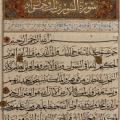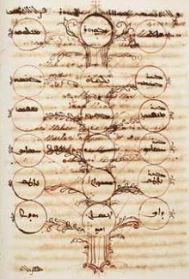180 - Proof Positive: The Logical Tradition
Logicians ply their trade across a millennium of Islamic history, considering such issues as the status of logic itself and the Liar Paradox.
Themes:
• A. Alwishah and D. Sanson, “The Early Arabic Liar: the Liar Paradox in the Islamic World from the Mid-Ninth to the Mid-Thirteenth Centuries CE,” Vivarium 47 (2009), 97-127.
• K. El-Rouayheb, Relational Syllogisms and the History of Arabic Logic, 900-1900 (Leiden: 2010).
• K. El-Rouayheb, “Post-Avicennan Logicians on the Subject Matter of Logic: Some Thirteenth- and Fourteenth-Century Discussions,” Arabic Sciences and Philosophy 22 (2012), 69-90.
• K. El-Rouayheb, The Development of Arabic Logic (1200-1800) (Basel: 2019).
• D. Perler and U. Rudolph (eds), Logik und Philosophie: Das Organon im arabischen und im lateinischen Mittelalter (Leiden: 2005).
• N. Rescher, The Development of Arabic Logic (Pittsburgh: 1964).
• T. Street, “Arabic Logic,” in D.M. Gabbay and J. Woods (eds), Handbook of the History of Logic vol.1: Greek, Indian and Arabic Logic (Amsterdam: 2004), 471-556.
• J. Walbridge, “Logic in the Islamic Intellectual Tradition: the Recent Centuries,” Islamic Studies 39 (2000), 55-75.
Stanford Encyclopedia: Arabic and Islamic Philosophy of Language and Logic
My thanks to Riccardo Strobino for advice on this episode!







Comments
Apple Podcasts App
I listened to this episode with my iPhone’s web browser, but I don’t seem to be able to get it to show up on my Podcasts app. Maybe there’s just a delay.
In reply to Apple Podcasts App by SMatthewStolte
Episode not in podcast app
I have the same issue.
In reply to Apple Podcasts App by SMatthewStolte
It is showing up now
It is showing up now (Monday).
In reply to It is showing up now by SMatthewStolte
upload
Sorry, this was my fault - I didn't upload it properly. But as you say it's fixed now!
In reply to upload by Peter Adamson
Thanks for the for the
Thanks for the for the response. Glad it was simple.
Logic Resource
David Marans,Open Access, LOGIC GALLERY, http://humbox.ac.uk/3682/
Mulla Nasr al-Din
Is this character based on an actual person, or is it just a placeholder name people use for such jokes?
In reply to Mulla Nasr al-Din by Hoom
Nasr al-Din
Good question. I don't know actually but I assumed the latter.
We still study logic in Madrasa!
As late as the 20th century? Bihari's Sulum Al-Ulum and dozens of commentaries on it are still required reading in many of the better off subcontinental madrasas. In some cases commentaries on the Sulum account for the bulk of the subject, alongside Al-Abhari's classic commentary on Ibn Al-Muqaffa's translation of the Isagoge. It might be rare, but a distant relative of mine did study Avicenna's Al-Shifa during her time in madrasa which is very unusual. The extent to which new works on logic are produced appears miniscule, for various reasons, but I think it's wrong to imply that it's a dead tradition. Avicenna, Mullah Sadra, Muhibb Allah Bihari, Hussein Maibazi, Mullah Jaunpuri and Mir Muhammad Zahid are still studied in many places and not as mere historical figures.
In reply to We still study logic in Madrasa! by Madrasa drop out
Madrasa curriculum
Yes, thanks for pointing this out! I think I allude to this a bit more in later episodes; and anyway I didn't mean to imply it is a dead tradition, it also lives on in the schools of Iran. I'm fascinated to hear about your relative studying Avicenna directly!
Liar's Paradox
I first encountered the Liar's Paradox in "Sideways Arthimatic from Wayside School." There it is "1. the answer to question 2 is false" "2. the answer to question 1 is true". the 'solution' i came up with in elementary school was focused on breaking the infinite chain. so i said if 1 is true, 2 is false, but if 2 is false, then 1 can't be true, so 1 is false. however, just because 1 is false, doesn't mean 2 is true, it just means that 2 is a different kind of false than 1 is refering to. therefore both of them are false. i guess it was based on the idea that there is only one way to be right but many to be wrong. i don't really fully remember the reasoning, but the answer stuck with me all these years.
if i wanted to follow young me's ideas and explore them, being my own historian, i might argue:
"if 1 is true, then 2 must be false. but then if 2 is false, one just has to be not true. If 1 is not true, that doesn't mean it is false (just like not white doesn't mean black), therefore, 2 is false, and 1 is just not true. therefore, the problem is the idea that a statement is only true or false."
i don't think i'm hitting on any real solution, just thought i'd share, however.
In reply to Liar's Paradox by Alexander Johnson
Liar's paradox
Yes, that is a possible solution: just introduce a third status or truth value like neither true nor false. But most logicians, historically, were committed to the Aristotelian principle that there is no such third truth value so this was not an available way out.
Resource Correction
My previous comment suggests the Open Access LOGIC GALLERY.
Its address has changed to http://humbox.ac.uk/5497/
Idea about the liars paradox
It feels like with the liar's paradox, it doesn't actually refer to anything, and so there is no (assuming a correspondence theory about truth) state of affairs that it says is true or false.
This might first seem absurd at first blush. Surely, it refers to itself right? So it does refer to something! Not so fast. Think about it like this - "this statement is false". Ok, to evaluate that, I need to check the thing it refers to, that is, this statement, which says "this statement is false". Again, to evaluate if that is true, I now need to evaluate the thing it is referring to, which is this statement again, which is "this statement is false". And keep going. instead of getting to any state of affairs to evaluate if the statement aligns with it or not, we "fall through" so to speak, never actually reaching the referential ground. Infinite recursion. Contrast this with saying "this statement is in English", check what it is referring to, which is itself "this statement is in English", and after thinking for a split second I can see that it is indeed in English. The reference lands.
On a different note, did any philosopher think that "this statement is true", the opposite of the liar, is of any interest? One thing that springs to mind actually is that,unlike the liar (given the traditional analysis of it, putting aside the fall through idea) which seems like it can't be given a truth value because it would lead to a contradiction, the truth value of "this statement is true" seems indeterminate. No matter which of the two values you give it, it will be consistent, irrespective of any state of affairs. So nothing, absolutely nothing, can determine if it is true or not, since it will always be consistent with itself being true or false. Both kinds of statements make sense
In reply to Idea about the liars paradox by Andrew
Liar paradox
Yes, those are good ideas especially the one about "this sentence is true." The obvious difference there is that assuming it to be true (or false) causes no difficulties. In general, when we are just doing logic, we are bracketing questions about what is actually true so only necessary truths can be taken to be in fact true. Rather, we make assumptions and think about what would follow from them. Assuming the Liar statement does seem to give rise to a contradiction.
Your "it doesn't refer" solution belongs to a family of solutions that denies that the Liar has a truth value, I mean, it is neither true nor false. And we see that in both Islamic and Latin Christian medieval philosophy. But the way you develop it is interesting because it shows how the Liar can prompt reflection on the truth conditions of sentences, e.g. do they have to refer to a determinate state of affairs to be true or false? Actually your "this sentence is true" example makes the same point.
In reply to Liar paradox by Peter Adamson
I've always felt that…
I've always felt that something was just wrong with the liar statement, really. An Ouroboros eating its own tail. Same with, maybe we should call it, the truthful statement. I am actually quite proud of the idea I suggested, since it does hinge on the way it self refers without just disallowing self referential statements, which I agree are sensible, just that the liar (and truthful) in my opinion are not.
Are there any philosophers you know of that explicate a similar idea to the one I sketched out about the liar (or also thought that "the truthful" was similarly interesting)? I have a comp sci background, so the angle I was coming at the problem thinking of it similar to a variable and evaluating it. So maybe if anyone actually outlined a similar solution it would be a modern analytic philosopher. I would also be interested in if there is any critique of the solution I have outlined.
In reply to I've always felt that… by Andrew
Earlier solutions
Actually your solution is pretty similar to some medieval solutions, including one I was just looking at this weekend in Arabic! The way they put it is that the Liar sentence doesn't satisfy the classic definition of "truth" because it doesn't "correspond" to anything in the way things are.
In reply to Earlier solutions by Peter Adamson
Ooo interesting. Can you…
Ooo interesting. Can you list some of those philosophers and the relevant work? Hopefully it isn't all only in either Latin or Arabic.
In reply to Ooo interesting. Can you… by Andrew
Liar paradox
Yeah a lot of it is in Latin and Arabic unfortunately. But for the Arabic tradition you can check out this article: A. Alwishah and D. Sanson, “The Early Arabic Liar: the Liar Paradox in the Islamic World from the Mid-Ninth to the Mid-Thirteenth Centuries CE,” Vivarium 47 (2009), 97-127 which I have in the bibliography above. And for Latin, I do get into it in this episode:
https://www.historyofphilosophy.net/fourteenth-century-logic
And I think the readings listed there by Read and Spade would be a good place to start though my memory is hazy about exactly what is discussed where, it was a while ago that I worked on that episode!
Add new comment